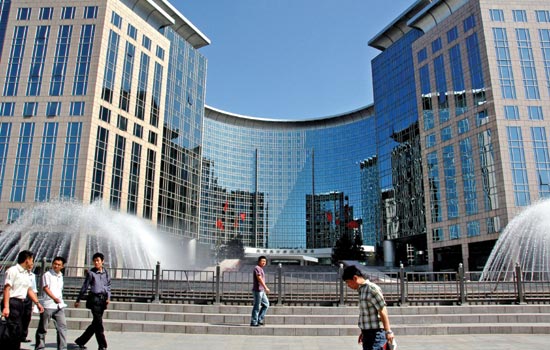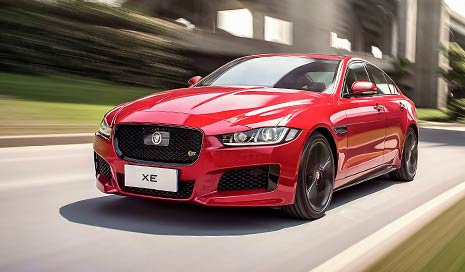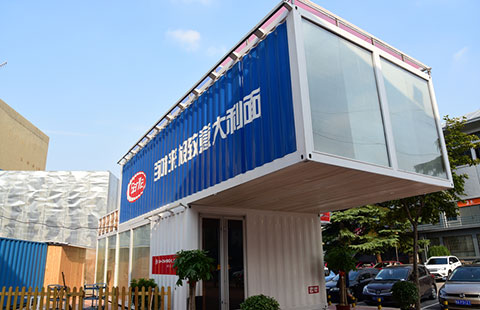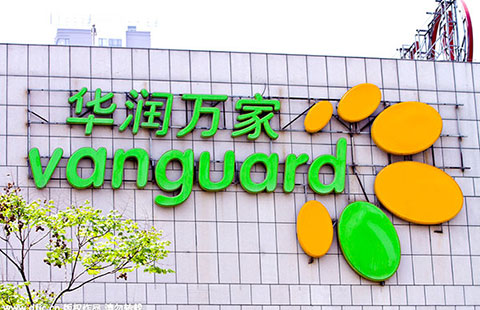Long-term view fuels Hyatt's success
By Wang Zhuoqiong (China Daily) Updated: 2012-06-28 10:18
|
 |
|
Grand Hyatt Beijing on Chang'an Avenue. Chicago-based Hyatt Hotels Corp currently operates 19 properties in China under the brands of Park Hyatt, Andaz, Grand Hyatt and Hyatt Regency. [Photo/China Daily] |
Since becoming head of Hyatt in 2006, Hoplamazian has turned in what many regard as a sizzling performance.
He took the company public in 2009. A year later, Global Hospitality Services - a leading hotel consulting and services organization - credited his leadership with lifting the stock price 39 percent and growing earnings before income tax, depreciation and amortization - a key performance and compensation measure - by 143 percent from the year before.
Having served as an adviser to various Pritzker family-owned companies including Hyatt Hotels Corp, he said it was a wonderful opportunity to oversee many businesses.
"(The experience) provided a great perspective," he said.
But in his first year as the head of Hyatt in 2006, he recognized that he didn't know the business very well. He then spent a full year learning it.
"In my view, it is the best thing I could have done," he said.
"With fresh eyes, I asked a lot of questions. I learned a lot while others learned with me. That inquiry in coming into the company that way made a difference."
Chinese market
China remains central to Hyatt's global growth strategy, Hoplamazian said. The group's Asia-Pacific results were driven by strength in China, according to its annual report for 2011.
With a booming demand and a relatively limited supply, China is at a wonderful stage of development, Hoplamazian said.
Compared with the mature market in the United States, he said a forward-looking mindset should be adopted in China.
"In China, you look at the evolution of the local economy and what kind of business and leisure travel you can expect from that," he said.
Take the city of Chengdu, in Sichuan province, as an example. Work started on building some hotels five years ago when the market probably would not have supported it. By the time they were open, the economy had accelerated so much these hotels became a success, he said.
A long-term perspective helps a hotel management make wise decisions, said Hoplamazian.
He said building a hotel which stands for decades requires long-term vision. "What happens next year, or in a very short period of time, if one makes a decision based on that - it is not wise to do that in our business," he said.
In the robust hospitality market in China, it is a challenge for a hotelier not to be excited about the opportunities. But Hoplamazian takes a more careful approach.
"We don't jump on any property or opportunities that are thrown to us," he said. "We take time to think about how we can best represent our brand."
A full assessment in new development is also critical. At the beginning of a project, Hyatt analyzes every single hotel transaction to ensure the hotel itself will be a success commercially and financially over time.
Understanding local partners also consolidates their presence in a foreign market.
"It is a marriage, not a trade," said Hoplamazian. "We and our partners will be together for decades. You don't do every deal presented to you. We take a very careful approach to make sure of its success."
Expansion plan
With the support of local partners, the US hotelier has expanded to many second- and third-tier cities, a major driver of the company's growth in China. They include Changbaishan in Jilin province and Hangzhou in Zhejiang province.
"I don't think they are second- and third-tier cites," Hoplamazian said. "From my perspective, they are big, vibrant cities, with significant economic activity and large populations. They are really great opportunities."
Hotel brands with selected services - namely Hyatt Place and Hyatt House hotels - are on the top of the agenda in Hyatt's blueprint for China over the next several decades, said the president.
The group has two Hyatt Places and one Hyatt House being built in Shanghai.
"We will build an increasing number of Hyatt Places and Hyatt Houses," said Hoplamazian. "This is the biggest growth area for us in the next 10 to 20 years. This trend is very clear."
The rise of China's middle class and affluent families is the reason why Hyatt chose to expand hotels with selected services.
After rapid development in 2010, high-end hotels, which have increased in number to more than 600, are close to saturation point, according to a development report on China's hotel industry.
The next step for high-end brands is not growing in number but in specialized services, the report said. The rise of the middle class will create demand for medium-end hotels.
"The number of markets we can serve with these brands is significantly larger than the market we can serve with our full service brands," said Hoplamazian. "The cost of building them is lower."
wangzhuoqiong@chinadaily.com.cn
- Tsinghua Holdings plans $78.4m fund to aid tech transfer
- Ding Lei to steer LeTV's auto ambitions
- Top 10 richest Chinese tech giants
- Baidu sets sights on Brazil, Indonesia, India markets
- Demand for pilots and technicians in Asia Pacific growing
- Kweichow Moutai honored with international spirits award
- Anbang insurance group announces new mobile platform
- Chinese liquor wins intl competition
















